Is your VPN making everything feel slower? If you’ve ever wondered “does a VPN slow my internet?”, you’re not alone. It’s one of the most common concerns among new VPN users. While VPNs offer privacy and security, they can sometimes affect your speed. The good news? Not all slowdowns are unavoidable and some fixes are easier than you think.
Let’s break down why this happens, how much it really matters, and what you can do to speed things back up.
How a VPN Affects Your Internet Speed
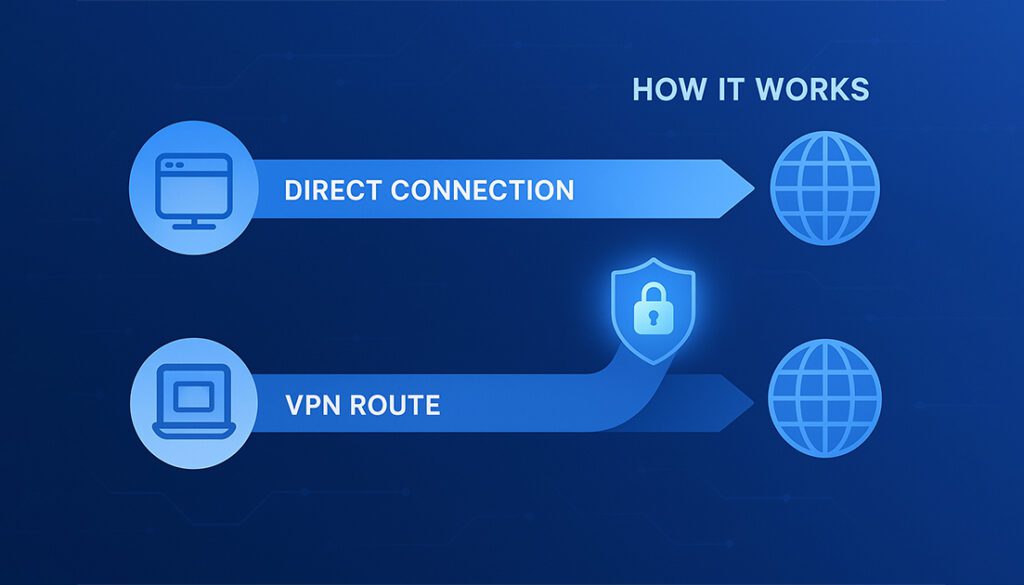
A VPN acts like a secure tunnel between your device and the internet. To make that happen, your data is encrypted and routed through a remote VPN server, which adds a few steps to the journey.
Here’s how that can impact your connection:
🔐 Encryption Overhead
Your device needs to encrypt and decrypt data, which adds a tiny bit of processing time.
🌍 Longer Routes
Instead of going straight to a website, your data takes a detour through the VPN server, especially if it’s in a different country.
🔥 Server Load
If too many users are connected to the same VPN server, it can slow everyone down.
The effect is usually small, but it depends on the provider, server location, and your own network.
Good VPNs invest in high-speed servers and smart routing, so the slowdown is barely noticeable in most cases.
Common Reasons Why VPN Slows Down Internet
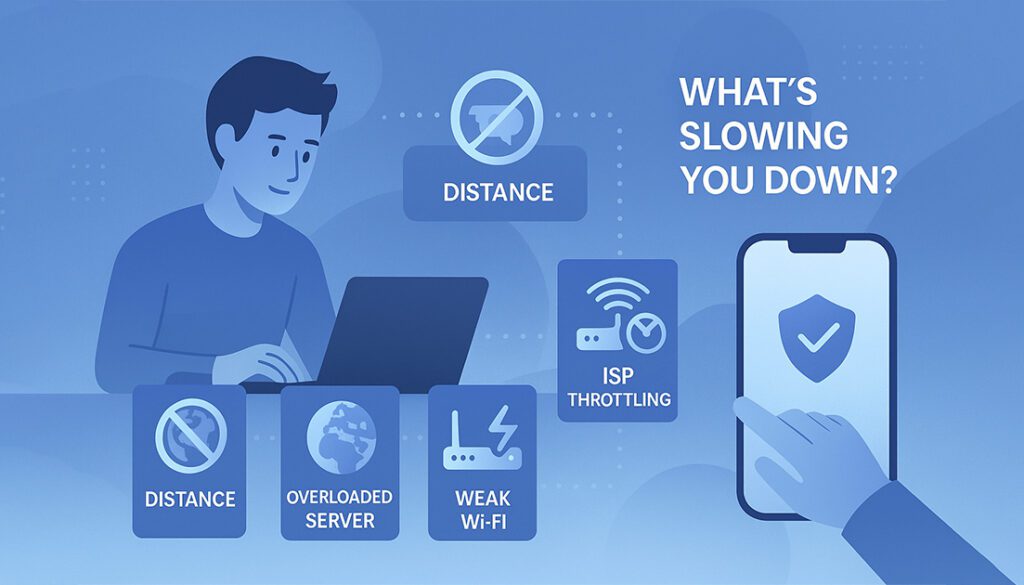
Not all slowdowns are caused by the VPN itself. Often, it’s a mix of factors — and knowing them can help you fix the issue faster.
🧱 Typical Speed Bottlenecks:
🌍 Faraway VPN Server
Connecting to a server across the globe adds latency. Try one closer to your location.
📈 Overloaded Server
Too many users on the same server = traffic jam.
📉 ISP Bandwidth Limits
Some ISPs throttle traffic when they detect VPN usage.
📡 Low-End Router or Device
Your hardware might struggle with encryption, especially on older phones or routers.
⚙️ Wrong VPN Protocol
Some protocols (like OpenVPN TCP) prioritize stability over speed.
🎯 Pro Tip: Many modern VPNs let you choose faster protocols like WireGuard or switch to a less crowded server, it can make a big difference.
How to Fix a Slow VPN Connection
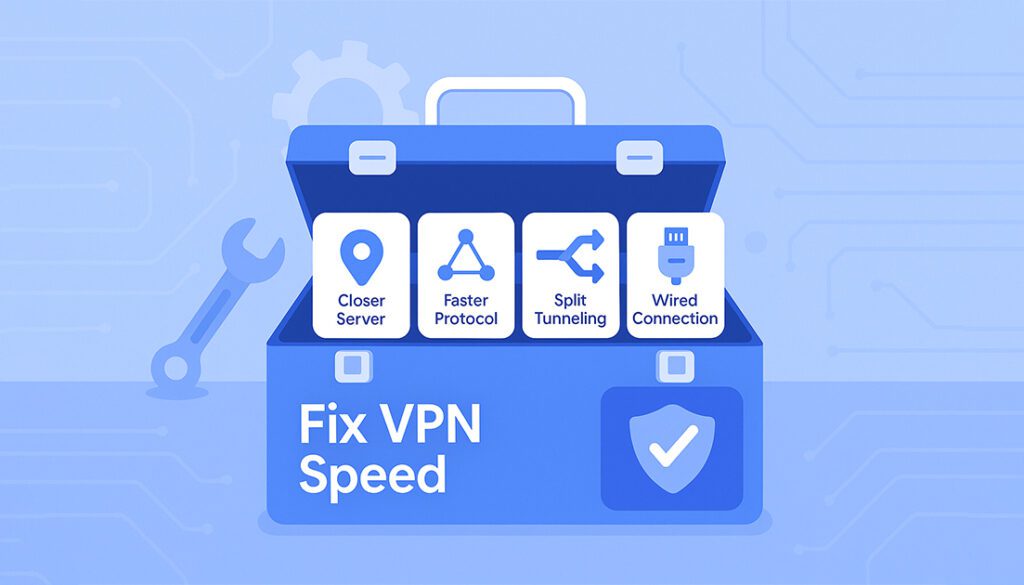
If your VPN is dragging your speed down, don’t panic, most issues are easy to solve with a few smart tweaks.
🔧 Try These Fixes:
📍 Switch to a Closer Server
Always choose a server geographically closer to your location.
⚙️ Change Protocols
Use faster protocols like WireGuard or IKEv2 instead of OpenVPN TCP.
🔄 Restart or Reinstall the App
Glitches happen. A quick restart or reinstall can reset stuck performance settings.
📆 Avoid Crowded Times
Some VPN servers slow down during peak hours. Try off-peak browsing.
💳 Upgrade Your Plan or Provider
Free or budget VPNs often lack bandwidth and infrastructure.
🔌 Use Ethernet Instead of Wi-Fi
If possible, a wired connection reduces interference and latency.
🚦 Whitelist Safe Apps (Split Tunneling)
Only route sensitive traffic through the VPN, this boosts overall speed.
🧠 Tip: Most premium VPNs let you view server load in real time, use that to your advantage!
When VPN Speed Drops Are Most Noticeable
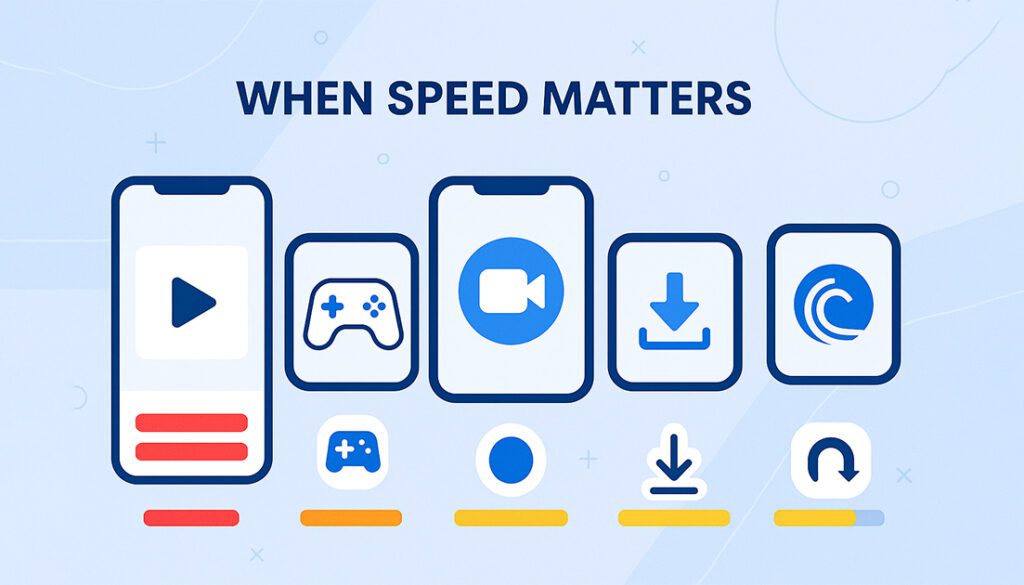
Not all online activity feels the slowdown equally. Depending on what you’re doing, a slight drop in speed might be unnoticeable, or totally frustrating.
🎯 Here’s When It Matters Most:
🎥 Streaming in HD or 4K
Any buffering ruins the experience. Speed matters here.
🎮 Online Gaming
Even minor latency can mean game over.
📹 Video Calls
Choppy audio and frozen frames? VPN lag could be the cause.
📦 Large File Downloads
VPNs may reduce download speeds slightly depending on the server.
🧲 Torrenting
Many VPNs throttle peer-to-peer traffic unless they explicitly allow it.
🧠 Tip: If you’re using a VPN for one of the above, choose a provider known for speed, not just privacy.
Best VPNs With Minimal Speed Loss
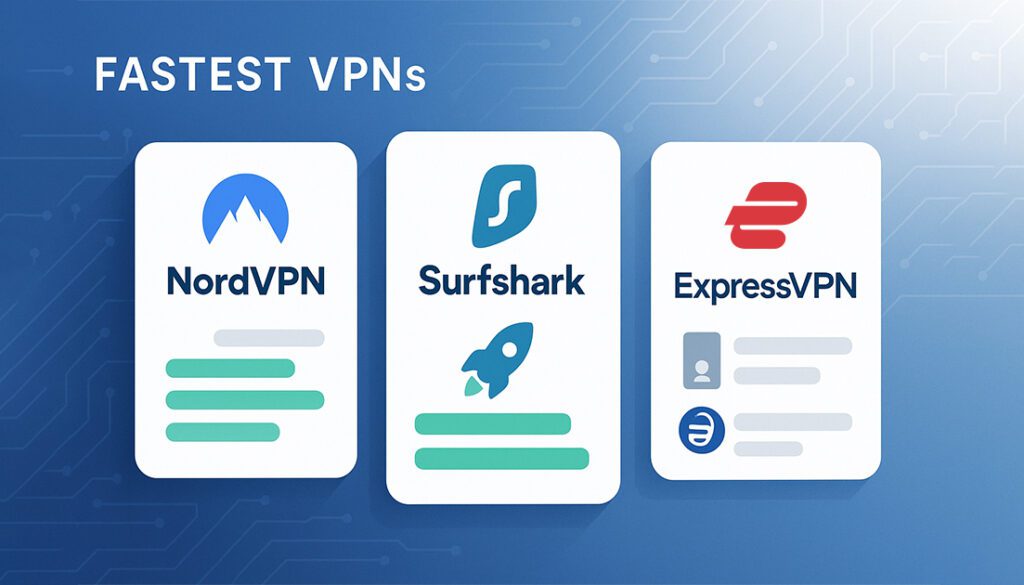
Not all VPNs slow you down. The best providers invest in faster servers, modern protocols, and performance-boosting tech like smart routing and split tunneling.
Here are three top-performing VPNs known for excellent speed with security:

NordVPN
- WireGuard-based NordLynx protocol = blazing speed
- Over 5,800 servers worldwide
- Split tunneling + specialty servers

Surfshark
- Fast global speeds + unlimited connections
- WireGuard, IKEv2, and OpenVPN support
- CleanWeb and rotating IP features
Common Myths About VPNs and Internet Speed
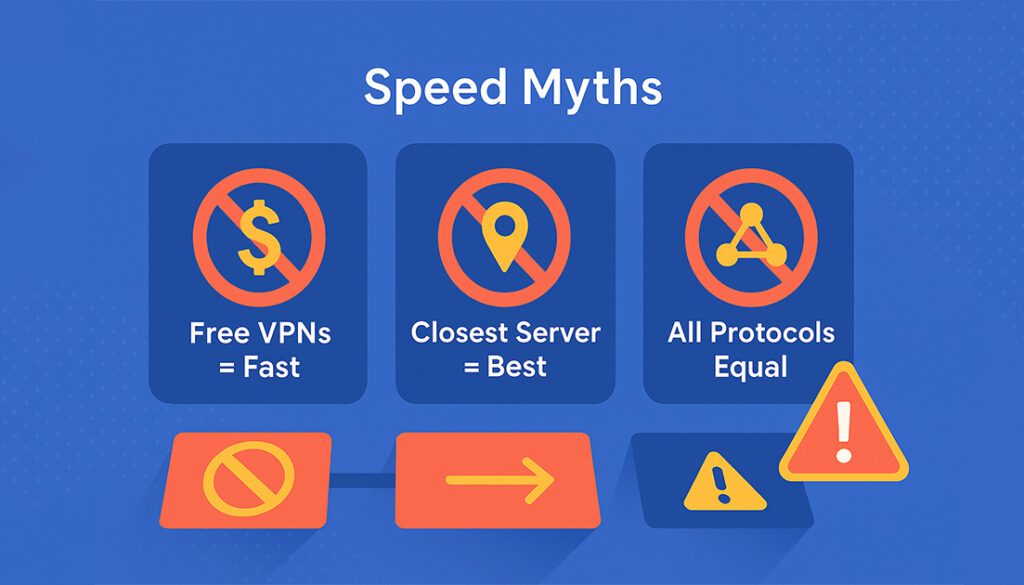
Even though VPNs have been around for years, there are still plenty of myths floating around. Let’s clear a few up:
🧨 Top VPN Speed Myths:
❌ VPNs Always Make Internet Slow
Not true. With premium VPNs, the speed difference is often unnoticeable.
📍 Closest Server = Fastest
Not always, some distant servers are faster depending on traffic and infrastructure.
💸 Free VPNs Are Just as Fast
Free VPNs usually have strict bandwidth limits and slower speeds.
⚙️ All Protocols Perform the Same
WireGuard is significantly faster than older protocols like PPTP or OpenVPN TCP.
🔐 More Encryption = Slower Speeds
Not necessarily, modern protocols are optimized to be both secure and fast.
FAQs
Does using a VPN always slow down your internet?
Not always. While a VPN adds a small delay due to encryption and rerouting, a high-quality VPN usually causes minimal slowdown.
Why is my VPN slowing down my Wi-Fi?
It could be due to distant servers, an overloaded VPN server, or an inefficient VPN protocol. Try switching servers or using WireGuard.
How much speed does a VPN reduce?
On average, you might lose 10–20% of your base speed. With top-tier VPNs and nearby servers, this can drop to under 5%.
Can I improve my VPN speed?
Yes, switch to a closer server, use a faster protocol, or upgrade to a premium provider with better infrastructure.
Is VPN speed slower on mobile than desktop?
It can be, especially on older phones. Limited CPU and battery-saving settings can impact encryption performance.
Does using a VPN always slow down your internet?
Do free VPNs slow down internet more?
Yes. Free VPNs often have limited bandwidth, crowded servers, and no support for modern protocols like WireGuard.
Will using a VPN affect my ping in games?
It might. VPNs increase latency, especially if connected to a distant server. Choose a gaming-optimized or nearby server to reduce this.
What’s the fastest VPN protocol?
WireGuard is currently the fastest mainstream protocol, balancing speed and security better than OpenVPN or IKEv2.
Final Thoughts
So, does a VPN slow down your internet? Sometimes, but it’s not the full story. The impact depends on your provider, the server you choose, and how well your VPN is optimized.
With the right setup, the slowdown is often minimal. And for the privacy, security, and freedom you gain? It’s more than worth it.
If speed is a top priority for you, go with a VPN known for performance and don’t forget to tweak your settings to get the most out of it.
Want a VPN That Won’t Slow You Down?
We’ve reviewed the fastest and most reliable VPNs that balance speed with privacy. Find the best one for streaming, gaming, or browsing.
View Top VPNs


